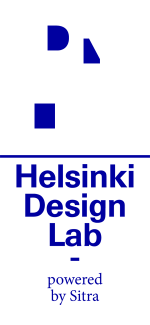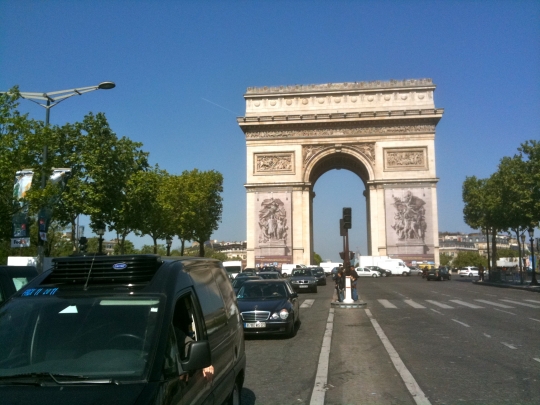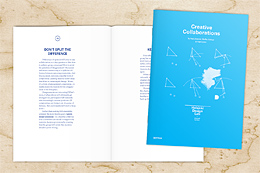It's already the wee hours of Monday, so technically this weeknote is being written on the first day of the HDL Studio on Sustainability. Tonight we welcomed the team to Helsinki with a quick dinner at Kuu Kuu before sending everyone back to the hotel to rest up in preparation for the quixotic week ahead.
Since we're at the very beginning of the week, let me introduce the studio:
- Alejandro Aravena. Executive Director, Elemental, Chile
- Dan Hill. Senior Consultant, Arup, Sydney (and prolific blogger)
- Janne Hukkinen. Professor of Environmental Policy, Helsinki University
- Seppo Junnila. Professor of Real Estate Business, Aalto School of Science & Technology
- Patricia McCarney. Director, Global City Indicators Facility, University of Toronto
- Federico Parolotto. Senior Partner, Mobility in Chain, Milan
- Matthias Rudolph. Project Leader, Transsolar, Stuttgart
- Katharina Schmidt. Masters of Spatial Design Student, Aalto School of Art & Design
This talented bunch will be spending the next five days with in Helsinki where their mission is to begin unpacking the complexities of carbon neutrality for Finland and to think about what a roadmap to carbon neutrality would look like.
One question we often get is "how do you pick the studio teams?" During the HDL Studio on Education someone went so far as to say that they felt like they were participating in an Agatha Christie novel: a group of people are mysteriously pulled together out of thin air—why are they here and what will they do now?
So, a few brief words describing our best guess as to how you build a successful team for this kind of work. To begin, it's important to know that as the research for the Challenge Briefings developed, we created expertise profiles for each studio. These were running lists that identified what we consider to be key perspectives for each studio topic.
In Sustainability we knew that building physics, transit, and policy would be essential areas, for instance. These are quite predictable. But we also sought some perspectives that might at first be unexpected. The thought behind this is simple: if you only include the regular suspects you will only get regular results.
Here are the basic rules of thumb that we used when thinking about the mix of the team and how to select the right individuals:
Keep it small: With too few people there's a danger that conversation will not be robust enough, but with too many people in the room it's difficult to have a single conversation. Based on experience, and a bit of advice from Dan Goldin, a team of eight is optimal. This has worked out very well for us. Some things work well in large groups, but strategy sessions are not one of them.
No room for duplicates: The studio team will be working quickly, which means that the collective expertise and experience in the room is the team's largest asset. Although team members may have some overlaps in their interests, it's best if each member is the master of their own domain and offers serious, focused expertise about their field. Each member becomes a 'representative' of their expertise and no one is redundant.
Only accept the best: When it comes to selecting individuals, we've gone straight to the top. Across the board, we feel that the studio members we've attracted are either at the top of their respective fields or upcoming talents. High quality input may not quite guarantee high quality output, but it's certainly a prerequisite.
Flexible expertise: It doesn't matter if you're the top expert on the planet in subject XYZ unless you're able to relate to others and convey your ideas in an open, productive manner. For this reason, we look for people who are at the top of their field, know their material inside and out, but are also naturally curious about the world around them, and able to sociably entertain models that conflict with their own.
Be (a bit) local: One of the great strengths of the HDL Studio format is that it offers a very fast and focused infusion of international expertise. But bringing in a wholly international group can lead to fruitless conversations when the cultural context is not understood. We set a rule of thumb for ourselves that two of the studio members would be Finns so there would always be 'cultural ambassadors' in the core team.
Design is the glue: Each of the studios have two designers who work as facilitators amongst a group of peer-experts. It's their job to ensure that the conversation is balanced and holistic. Only a particular kind of designer will work in this context. They need to be able to apply their training to strategic issues.
If these are the rules that guide our choices, one might ask how we first narrow the field. So far, the best indicator we have is that the kinds of people who succeed in collaborations with HDL are those who have significant experience in multiple cultures. Marco likes to use the term Third Culture Kid. This may be "culture" as it's typically defined or it may also refer to different cultures of expertise or work.
If I have the choice between an expert in astrophysics and an expert in astrophysics with a previous background in agriculture, my bet is on the latter. There's something about having lived in multiple cultures that prepares an individual for the kind of lateral thinking that is required in an HDL Studio.
Finally, the mix of the studio in terms of both expertise and personality is important. While one my be able to judge an individual's expertise by broswing a CV and reading some publications, it's very difficult to assess whether an individual will work well as part of a team unless you meet them in person. Sharing a phone call works too, but it's not as effective as having a face to face conversation with someone.
For all of these reasons listed above, we devote a lot of time to sketching out the right mix for a team, courting a qualified pool of invitees, and working to secure their participation. By way of example, the process of defining the HDL Studio teams began eight months before the first studio.
Editor's note: These reflections on developing the HDL Studio Teams have been updated in a new post here.
Which brings us to the end of this rather long weeknote. It was full of powerpoints: Marco spent Tuesday in Valamo, where he gave a presentation the Valamo Monastery's seminar on Divinity and Truth, and then closed the week as a respondent on a panel entitled "Helsinki – an Open and Cosmopolitan City?"
Meanwhile, I was in Paris to attend the SIX Spring School, to share our work at HDL, and to continue digging in to the ageing content in advance of our own Ageing studio which will happen in June. Thanks Geoff, Louise, and everyone else for a great event!



